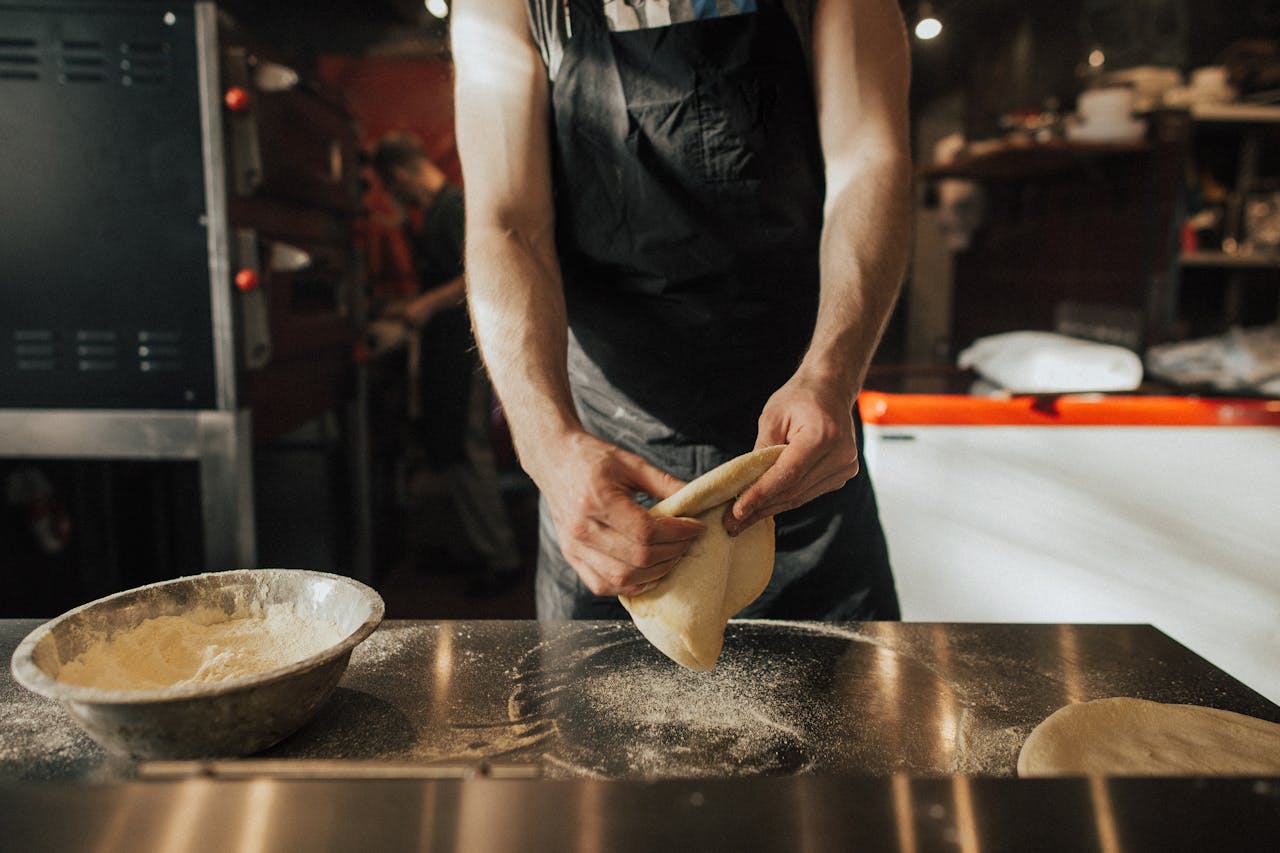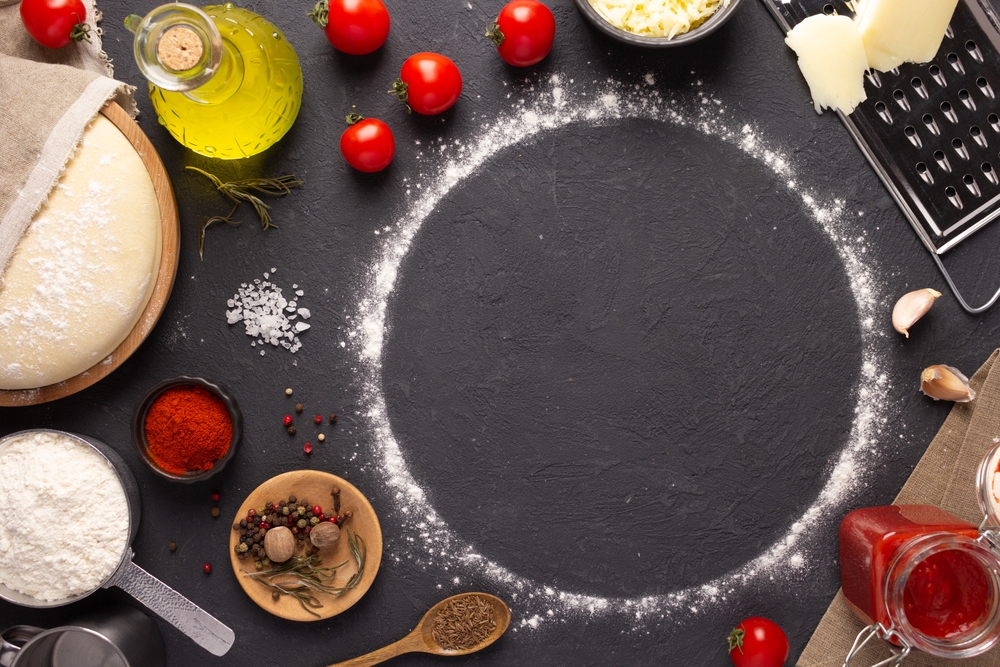Essential Ingredient Checklist For Pizzerias
By Nikita Nielsen · 7. June 2024
Having the right equipment and tools in your pizzeria is essential, but it’s equally important to prioritize fresh, high-quality ingredients.
With a well-stocked kitchen and a commitment to quality, you can serve exceptional pizzas every time. 🍕
This guide provides a complete checklist of the key ingredients you need in your pizzeria.
Key Takeaways
- Pizzerias need a variety of ingredients like raw or pre-made dough, meats, vegetables, and different types of cheese to create delicious pizzas.
- Choosing the right pizza oven and other equipment such as mixers and refrigeration systems is crucial for a pizzeria’s success.
- Fresh herbs, high-grade flour, olive oil, and quality tomatoes are key to making standout pizza bases and sauces.
- It’s important for pizzerias to work with reliable ingredient suppliers to ensure the freshness and quality of their pizzas.
- Implementing an effective inventory management system helps keep track of supplies and avoids running out of key ingredients.
Essential Ingredients Checklist for Pizzerias
 Man Preparing a Pizza Dough
Man Preparing a Pizza Dough
Pizzerias should have a variety of pizza bases, including raw dough, pre-made, and gluten-free options.
When it comes to toppings, pizzerias need a selection of meats, vegetables, and sauces. Different types of cheese are also essential, as well as flour, olive oil, and herbs.
Pizza Base Options
Choosing the right pizza base is crucial for any pizzeria. It sets the foundation for all the delicious toppings that follow.
Here’s a detailed list of options to consider:
- Raw dough: Ideal for those who want complete control over their pizza’s texture and thickness. This option allows creativity with shapes and sizes, catering to customers’ preferences.
- Pre-made bases: A time-saver for busy kitchens, pre-made bases come ready to top and bake. They offer consistency in quality and size, making them a dependable choice for pizzerias needing to serve many quickly.
- Gluten-free options: Catering to customers with dietary restrictions is important. Offering gluten-free pizza bases will attract a wider audience, including those with gluten intolerance or celiac disease. These can be made from alternative flours like rice or almond flour.
Each option has its place in a pizzeria, depending on what ingredients you need in your kitchen and the preferences of your diners.
Meats, Vegetables, Sauces
Creating the perfect pizza demands a wide range of toppings, and each choice can transform a pizza from ordinary to extraordinary.
Here are some essential pizzeria ingredients:
- Pepperoni: Classic choice with a spicy kick and crispy edges. 🌶️
- Ham: Sweet note, perfect with pineapple for Hawaiian pizzas. 🍍
- Sausage: Adds depth and heartiness, whether Italian or spicy. 🌭
- Bell Peppers: Adds sweetness and tanginess, brightening up any pizza. 🌶️
- Onions: Adds texture and a hint of sweetness, versatile for meat or veggie pizzas. 🧅
- Mushrooms: Earthy taste pairs well with meats, especially beef and sausage. 🍄
- Black Olives: Adds a distinct briny contrast, cutting through richer ingredients. 🫒
- Spinach: Brings a mild, green flavour and nutritional boost. 🥬
- Artichokes: Offers sophistication with a slightly nutty and sweet taste.
- Tomato Sauce: Foundational element, providing acidity that balances rich flavours, including BBQ and pesto variations. 🍅
Each ingredient contributes to an unforgettable lineup, balancing flavours and textures to suit every taste.
Types of Cheese
Choosing the right cheese can turn a good pizza into a great one. Each type brings its own unique flavour and texture to the mix.
Here’s a rundown of popular cheese options for topping pizzas:
- Mozzarella: Known for its excellent meltability and mild flavour, it’s the go-to choice for classic pizzas.
- Cheddar: Offers a sharper taste compared to mozzarella. When melted, cheddar adds a beautiful colour and rich flavour.
- Parmesan: Hard, granular cheese that is often grated over pizzas before or after baking for an extra kick of flavour.
- Gorgonzola: A type of blue cheese that brings a strong, tangy punch to gourmet pizzas. It pairs well with sweet toppings like caramelised onions.
- Ricotta: This creamy cheese is used in dollops on pizzas, especially white sauce ones, adding a soft texture and delicately milky taste.
- Feta: Crumbles beautifully and offers a salty bite that contrasts nicely with other ingredients such as olives and spinach.
- Goat Cheese: Soft and crumbly with a distinct tangy taste that elevates vegetable toppings on artisanal pizzas.
Flour, Olive Oil, Herbs
The foundation of any good pizza starts with high-quality flour, olive oil, and herbs, which all play an essential role in flavour and texture.
- High-grade flour is the backbone of any pizza dough. It gives the base its structure and chewiness.
- Extra virgin olive oil adds depth of flavour to both dough and sauce. A drizzle on top before baking can also give the crust a beautiful golden hue. 🫒
- Fresh herbs like basil, oregano, and rosemary elevate the taste profile of your pizza. 🌿
- Yeast is crucial for dough fermentation, creating lightness and air pockets within the base. Cold water mixed into your dough helps control temperature during mixing, affecting texture.
- Good quality canned tomatoes or fresh ripe tomatoes are key for making an authentic sauce that’s both tangy and sweet. 🍅
- Garlic adds an aromatic quality to sauces or can be used as a topping for added zing. 🧄
Each ingredient not only contributes its unique flavour but also interacts with others to create the ultimate pizza experience – proof that great things come from paying attention to every detail!
Ingredient Suppliers for Pizzerias
 pizza making ingredients on the table
pizza making ingredients on the table
Building a strong relationship with trusted ingredient suppliers is an essential aspect of running a successful pizzeria.
It’s all about getting the premium ingredients that make your pizzas stand out and keep customers coming back for more. 🚚
It’s advisable to look for suppliers who can offer not only high-quality products but also tailored support towards the ever-changing demands of a pizzeria.
Having suppliers who understand what you care about can make a big difference to the taste and appeal of your pizzas.
The importance of having firsthand experience with these suppliers cannot be overstated; seeking out those who understand the unique needs of a pizza restaurant unlocks the secrets to satisfying customer demand while maintaining profit margins.
When you’re planning your pizzeria, make sure to spend time looking for the right suppliers. It’s an investment that will pay off in delicious dividends for years to come.
Inventory Management Systems
To keep track of ingredient supplies, implementing an inventory management system is a game-changer. It helps monitor stock levels and ensures that essential items are always available.
With an inventory management system in place, you’ll have peace of mind knowing that your kitchen is well-stocked and ready to meet customer demands.
It streamlines operations and frees up valuable time for you to focus on crafting delicious pizzas.
Conclusion
So what’s the bottom line for pizzerias? Having the right equipment is crucial – from pizza ovens to reliable prep tools.
But just as important are the essential ingredients that give every pizza its unique flavour.
With a well-stocked supply of fresh ingredients in your pizzeria, you’ll always be prepared to delight your customers. 😋
Building strong relationships with ingredient suppliers ensures a steady flow of high-quality produce. Finally, implementing an inventory management system keeps everything running seamlessly.
FAQs
What’s the top ingredient every pizzeria needs?
High-quality flour is a must for crafting the perfect pizza base. Equally important are fresh toppings, flavorful sauces, and premium cheeses to create a delicious pizza that keeps customers coming back for more.
Is it important to use a specific type of cheese on pizzas?
Mozzarella cheese is a classic choice for its meltability and flavour, but adding Parmesan or Feta on top of a pizza is also common.
Do I need to have a variety of toppings available?
Having a range of toppings lets customers customise their pizzas to their liking.

